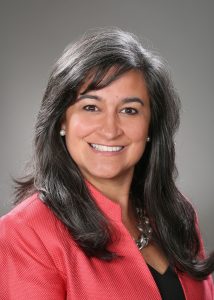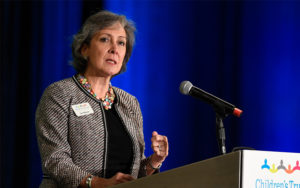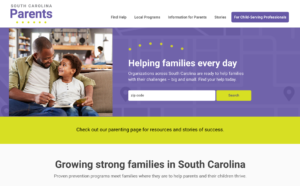As South Carolina’s State Child Advocate and director of the S.C. Department of Children’s Advocacy (DCA), Amanda Whittle serves as a champion for accountability and service to improve outcomes for children served by nine state agencies. The department is an important partner in removing barriers and helping families access services.
 Whittle was the guest expert at Ask the Experts, a recent event held by Children’s Trust. CEO Sue Williams hosted the online conversation to give Children’s Trust supporters greater insight into our organization’s work to prevent child abuse and neglect.
Whittle was the guest expert at Ask the Experts, a recent event held by Children’s Trust. CEO Sue Williams hosted the online conversation to give Children’s Trust supporters greater insight into our organization’s work to prevent child abuse and neglect.
The discussion highlighted the areas where the DCA, which was first established by the S.C. Legislature in 2019, and Children’s Trust have found common ground as both work to ensure children and families have resources and supports available to them.
“I believe we’re stronger together. Our system is a powerful system when we all pull together,” Whittle said. “We have to just be intentional about that and constantly know that we cannot do this work alone, and wherever we see opportunities to include others, we do. I appreciate Children’s Trust (being) very collaborative, very inclusive, and that’s important because our children and families need it.”
Transforming a System to Better Serve Families
The DCA consists of an investigations unit and three program divisions composed of a guardian ad litem program, continuum of care, and Foster Care Review Board, while Children’s Trust is working upstream with child-serving professionals and organizations through evidence-based prevention programs, statewide trainings, and local coalitions. Still, the end goal is similar, just as it is with the S.C. Department of Social Services, which provides protective services for families so they can achieve stability and permanency.
 “What really excites me about you (Amanda Whittle) and working with (S.C. DSS) Director (Michael) Leach is that we see here are our lanes, but we’re all rowing in the same direction. We’re not (rowing) against each other,” Williams said. “We collaborate where we can, and we keep each other informed about what’s going on. We can keep our boats going and not get stalled. I’m like (Whittle), I feel the sense of urgency to be out there for these children and families, and they can’t wait until we figure it out.”
“What really excites me about you (Amanda Whittle) and working with (S.C. DSS) Director (Michael) Leach is that we see here are our lanes, but we’re all rowing in the same direction. We’re not (rowing) against each other,” Williams said. “We collaborate where we can, and we keep each other informed about what’s going on. We can keep our boats going and not get stalled. I’m like (Whittle), I feel the sense of urgency to be out there for these children and families, and they can’t wait until we figure it out.”
Last year South Carolina was selected as one of four jurisdictions nationwide chosen to participate in the first tier of a cutting-edge national program that aims to move child welfare systems from traditional, reactive child protection systems to advanced systems designed to support holistic child and family well-being while preventing child maltreatment and unnecessary family separation.
This first-of-its-kind partnership – Thriving Families, Safer Children: A National Commitment to Well-Being – is an initiative developed by the U.S. Children’s Bureau, Casey Family Programs, the Annie E. Casey Foundation and Prevent Child Abuse America. This work being led by DSS and Children’s Trust in our state will include public, private and philanthropic sectors and create more just and equitable systems to break harmful multi-generational cycles of trauma and poverty to benefit all children and families.
Whittle, who’s an attorney and a certified child welfare law specialist, is hopeful as well about this particular effort.
“I am excited about transforming our system to a child and family well-being system that improves outcomes and improves resiliency for children and families,” she said. “It’s important to strengthen families. It’s important to strengthen communities. It’s important to try to remove the stigma that’s associated with folks who just need help.”
Finding Common Ground with Children’s Trust
Whittle cited the website created by Children’s Trust last year, scParents.org, as a valuable source of information when parents reach out for updated, accurate details about resources for families in their local communities. The website aims to destigmatize asking for help.
Williams sees plenty of parents who simply want to do the right thing for their families. The Strengthening Families Program (SFP) being implemented by Children’s Trust with local partners in 30 counties is a prime example of working on the front end to help parents and caregivers improve parenting skills; develop positive discipline practices; stay resilient in tough times; reduce conflict; and assist children with social skills, relationships, and school performance. SFP takes place over 14 weekly sessions and focuses on families with children ages 6 to 11.
“One of the things that I love about the work that we do with families is they come voluntarily to be better parents. So many have had bad experiences with their parents, and they want to be different,” Williams said. “They are really hungry for information on to how to be a good parent. And when we see (SFP) graduations, there’s hardly ever a dry eye. They just say, ‘This has transformed our family. Thank you so much.’ And they want to keep going because they want to keep getting better. It’s just so heartwarming to know that these families have so much strength.”

Sue Williams speaks at the 2019 Building Hope for Children Conference.
Whittle envisions her agency being involved with Children’s Trust through attending the upcoming Building Hope for Children Conference, a three-day virtual event March 23-25 for child-serving professionals, home visitors and prevention advocates. And she also wants DCA to play a part during Child Abuse Prevention Month in April along with Children’s Trust and DSS to raise awareness across the state about the importance of bringing organizations and communities together to build stronger families and resilient children.
Over the past year, the COVID-19 pandemic has changed the way of doing business for both Whittle’s agency and Williams’ organization. The two have needed to adapt their services, programs and trainings to serve families virtually and use technology to organize efforts that ensure children aren’t being left behind during these difficult times. They realize the work must keep advancing no matter what the circumstances.
“We’re just trying to prioritize the priorities and understand what type of measurable significance we can make that will cover the majority of children and families within our system, but also understand that we try to transform the system,” Whittle said. “There are people in the system, and those folks need to be met with some urgency and empathy with every single phone call. They can’t wait for two or three years until new things are implemented.”





